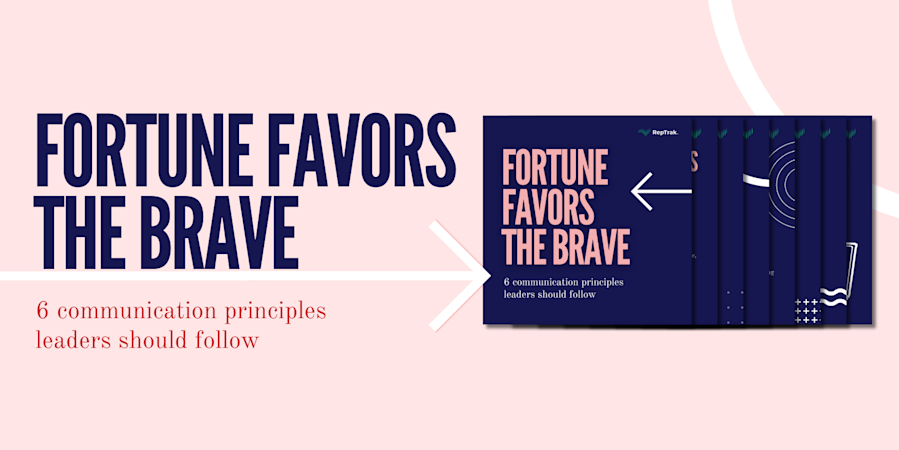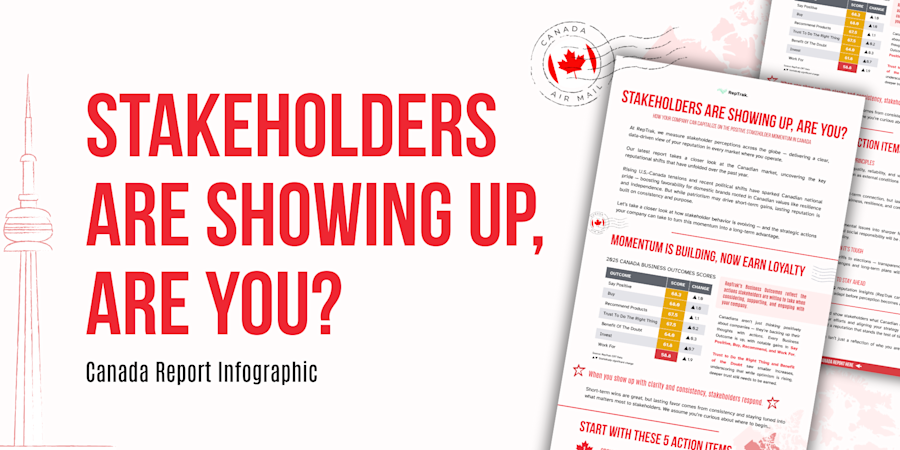This Year and Every Year, Credibility Is Everything
Blog Post20 Dec, 2018
Reputation is proving to be more salient than ever to long-term corporate success. And more companies are seeing the light and investing in their reputations—either in response to embarrassing and costly scandals or from their own foresight.
Here’s why corporate reputation will be even more relevant this year and beyond.
The “move fast and break things” sector has realized that reputation matters. For the past decade and a half, tech companies like Facebook, Uber, and Airbnb have channeled the gung-ho spirit of Civil War-era naval officer David Farragut: “Damn the torpedoes, full steam ahead!”
This year, however, the rebels of the digital revolution, chastened by scandal and outrage, have grown more thoughtful and more measured in their responses to criticism. They’ve come to see that, contrary to Joan Jett, many people—including governments and regulating agencies—do, in fact, “give a d*** about a bad reputation.”
Historical and pop culture references aside, we know this much: reputation is intricately tied to significant business outcomes. Here are some impactful things we learned in 2018 that will no doubt inform the year ahead. Corporate Communications and Marketing professionals, take note—lessons from Uber, Novartis, and Vanguard:
Improved leadership at Uber yields strong results
In September of 2017, Transport for London announced that it would not be renewing Uber’s license to operate in the British capital. In light of data breaches, labor infractions, and the use of “Greyball” software that allowed the rideshare giant to evade regulations, TfL declared Uber not to be “fit and proper.”
In response, new CEO Dara Khosrowshahi didn’t get angry or issue petulant denials. Instead, in an email to employees, he accepted responsibility and acknowledged that it matters what people around the globe think of Uber:
While the impulse may be to say that this is unfair, one of the lessons I've learned over time is that change comes from self-reflection. So it's worth examining how we got here. The truth is that there is a high cost to a bad reputation. Irrespective of whether we did everything that is being said about us in London today (and to be clear, I don't think we did), it really matters what people think of us, especially in a global business like ours, where actions in one part of the world can have serious consequences in another.
Following this setback, Khosrowshahi did more than merely self-reflect; he and the company took concrete steps to rehabilitate their increasingly tarnished image. In July of 2018, following a set of swift internal reforms, they got back their license to operate in London.
While not yet out of the woods, Uber has turned a corner when it comes to corporate citizenship. They see that municipalities, like London, are much more likely to let Uber play in their backyard if the company is seen to be acting in good faith and with good leadership.
Novartis now incentivizes ethical behaviors, not just sales
It’s been a rough few years for one of the pharmaceutical industry’s biggest companies: In 2016, Novartis paid a $25 million settlement over charges that the company bribed Chinese healthcare professionals to boost sales of their drugs. They’ve also come under fire for a $1.2 million payment to President Donald Trump’s former attorney, Michael Cohen, allegedly in search of friendly regulatory treatment from the administration.
Like Wells Fargo, whose incentive structure led lower-level employees to create fake accounts for real customers in order to boost their numbers (and who saw a 20% drop in their stock price once the scandal was revealed), Novartis has been forced to face the music when it comes to its internal culture: How did this happen? How can they stop it from happening again?
For Novartis, it’s been a revamping of their incentive structure: Instead of basing yearly bonuses on profits and sales figures, as they had in the past, Novartis is now including an “ethical behavior” component. An employee will receive a score of 1, 2, or 3 on their ethics, with a 2 indicating they met expectations, and a 3 indicating they exceeded expectations. Those receiving a 2 or a 3 will receive their yearly bonus, which can be up to 35% of their yearly salary. Those receiving a 1 will not; they could even be dismissed.
"We've tried to make sure we've got the right balance between pay for performance and having the right behavior," according to Samir Shah, Novartis's head of investor relations.
Novartis has also implemented a pilot program that puts greater scrutiny on expense reports from China, with an eye to catching bad behavior—like bribes—before it gets out of hand.
"This allows us to look at the behavior metric before any money leaves Novartis, and catch potential misconduct before there is any risk to our reputation," said Novartis general counsel Shannon Klinger.
Vanguard appoints Chief Risk Officer to manage global reputation
Unlike Novartis and Uber, Vanguard isn’t facing down a major scandal or reeling from regulatory reproach. It’s still one of the most respected investment management firms in the world, managing more than $2 trillion in assets.
In the 1970s, Vanguard pioneered the index fund and changed finance forever. Their appointment of Joseph Brennan, formerly Vanguard’s Global Head of Index Equities, as their new Chief Risk Officer shows the company is just as forward-looking thinking when it comes to reputation management. Reputation straddles many different departments, which is why Chief Reputation Officers (or chief risk officers, in this case) are so important: They are able to look at the big picture, across divisions and across continents, to see what lurks in the shadows, waiting to pounce on the reputation a company has spent years, even decades, building.
It’s not enough to leave reputation management up to different managers in different departments and assume it will all work out. There needs to be someone guiding overall strategy.
Vanguard clearly agrees.
“We believe centralizing our risk management functions under a single senior leader will benefit both our clients and Vanguard,” CEO Tim Buckley said in a statement. “Joe’s vast and varied investment management and leadership experience both in the U.S. and abroad make him the ideal candidate to integrate and enhance our capable and strong global risk management teams.”
Companies move towards a real reckoning on reputation
After a punishing few years of scandal for companies in a wide range of industries, senior leaders are seeing the importance of not just getting ahead of bad news, but of making meaningful change that wins back the confidence of consumers, regulators, and investors. Credibility, perception, and reputation rue the day for corporations. Wins in these areas ensure long-term business success.
Melanie Lobue Senior Director of Global Marketing The RepTrak Company [email protected] @melanielobue






